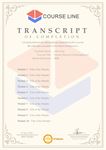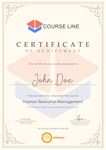
Cost Accounting: 2-Course Bundle
2-Premium Course *|* 2 Free Certificates *|* Designed by Industry Experts *|* Lifetime Access
Course Line
Summary
- Certificate of completion - Free
- Exam(s) / assessment(s) is included in price
- Tutor is available to students
Add to basket or enquire
Overview
The Cost Accounting: 2-Course Bundle is designed to provide learners with a comprehensive understanding of cost accounting principles and practices. This bundle includes two courses that cover essential topics in cost accounting, including cost behaviour analysis, cost-volume-profit analysis, budgeting and variance analysis, and job and process costing.
Through a combination of lectures, examples, and hands-on exercises, learners will develop the skills and knowledge necessary to effectively manage costs and make informed business decisions. The first course in the bundle provides an introduction to cost accounting, while the second course covers more advanced topics and applications.
Whether you are new to accounting or have some experience in the field, this bundle is a great way to enhance your skills and improve your career prospects. By the end of the courses, you will have gained a solid understanding of cost accounting concepts and their applications in various business settings.
Certificates
Certificate of completion
Digital certificate - Included
Course media
Description
The Cost Accounting: 2-Course Bundle provides a comprehensive introduction to cost accounting principles and practices. The bundle includes two courses that cover essential topics in cost accounting, such as cost behaviour analysis, cost-volume-profit analysis, budgeting and variance analysis, and job and process costing.
In the first course of the bundle, learners will be introduced to the basics of cost accounting, including the different types of costs, cost behaviour patterns, and cost-volume-profit relationships. Learners will also be introduced to various costing methods, including job order costing, process costing, and activity-based costing.
The second course builds on the concepts covered in the first course and focuses on more advanced topics in cost accounting. Learners will explore the application of cost accounting concepts in different business settings, including service industries, manufacturing, and merchandising. They will also gain practical experience in using cost accounting techniques to analyze data, create budgets, and make informed business decisions.
Throughout the courses, learners will engage in hands-on exercises and real-world examples to enhance their understanding of cost accounting principles and their applications. By the end of the courses, learners will have a solid foundation in cost accounting and will be able to use this knowledge to improve their decision-making abilities and advance their careers.
Certification
After successfully completing this bundle, you will get 2 Instant Free digital certificates.
Who is this course for?
This course is designed for:
- Students pursuing an accounting degree want to gain a deeper understanding of cost accounting.
- Business professionals, including accountants, financial analysts, and managers, are interested in enhancing their knowledge of cost accounting to improve decision-making.
- Entrepreneurs and small business owners who want to better understand their business's costs and profitability.
- Anyone who wants to learn about cost accounting and how it relates to business operations and financial reporting.
Requirements
To successfully complete the Cost Accounting: 2-Course Bundle, students should have:
- A basic understanding of accounting principles and financial statements, including balance sheets, income statements, and cash flow statements.
- Familiarity with basic algebraic equations and formulas.
- Proficiency in using spreadsheets and other financial software, such as QuickBooks or Xero.
- Access to a computer with a reliable internet connection.
Career path
Some potential career paths for individuals with expertise in cost accounting include:
- Cost accountant
- Financial analyst
- Management accountant
- Budget analyst
- Operations Analyst
- Pricing analyst
- Inventory manager
- Supply chain manager
- Business Consultant
- Entrepreneur or small business owner
Questions and answers
Currently there are no Q&As for this course. Be the first to ask a question.
Reviews
Currently there are no reviews for this course. Be the first to leave a review.
Legal information
This course is advertised on reed.co.uk by the Course Provider, whose terms and conditions apply. Purchases are made directly from the Course Provider, and as such, content and materials are supplied by the Course Provider directly. Reed is acting as agent and not reseller in relation to this course. Reed's only responsibility is to facilitate your payment for the course. It is your responsibility to review and agree to the Course Provider's terms and conditions and satisfy yourself as to the suitability of the course you intend to purchase. Reed will not have any responsibility for the content of the course and/or associated materials.





